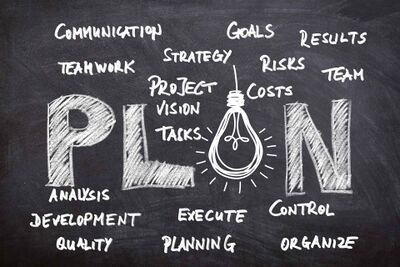Planning

When applying for a business loan, bankers frequently require a business plan.
Planning is the establishment of goals, policies, and procedures for a social and economic unit (such as a business).[1]
Planning skills help with goal setting and determining the most efficient path to meet objectives.
According to the career coach Jennifer Herrity:
| “ | Whether you're managing people, projects or a combination of the two, the ability to prepare a vision for the future and strategize solutions is essential to good management. Planning skills help when setting goals and determining the most efficient path to meet objectives.
They can also be useful when conducting administrative activities like budgeting and scheduling.[2] |
” |
Contents
Key steps in planning

See also: Goal setting and Prioritization and Resourcefulness and Project management and Management and Productivity and Organizational skills and Leadership
To create an effective plan:[4]
1. Start by setting clear and specific SMART goals (Specific, Measureable, Achievable, Relevant and Time-bound). See: Goal setting
2. Breaking down those SMART goals into actionable steps. See: Project management and Management
3. Prioritize tasks based on importance and urgency/deadlines. See: Prioritization
4. Identify the required resources (If resources are tight, see: Resourcefulness)
5. Assign responsibilities. See: Project management and Management and Organizational skills
6. Regularly monitor/track progress and adjust your plan/plans as needed while keeping your goals aligned with your overall vision. See: Organizational skills and Management and Productivity
7. Utilize a planning tool to track your progress and stay organized. See: Organizational skills and Project management
Articles on how to do planning
- How To Make a Plan in 5 Steps
- How to Plan Effectively
- How To Master Effective Planning: 9 Tips That Will Set You Apart
- How can you plan your daily, weekly, and monthly activities more effectively?
- How to Get Better at Planning in 2025?
- A Way to Plan If You’re Bad at Planning, Harvard Business Review
Key planning skills
Specific examples of planning skills:[5][6]

- Adaptability
- Logical reasoning
- Flexibility
- Negotiation skills
- Attention to detail
- Leadership skills
- Related: What Is Strategic Planning? Definition, Techniques and Examples
Strategic planning skills

See also: Strategic planning skills and Goal setting and Cascading goals
Definitionally, strategic planning is:
| “ | Strategic planning is a process used by organizations to identify their goals, the strategies necessary to accomplish those goals and the internal performance management system used to monitor and evaluate progress. Most organizations use a SWOT analysis or gap analysis to identify the underlying factors driving their current performance. This, in turn, provides information regarding the most high-leverage strategies to create change.
Companies looking to optimize their performance and growth rely on a strategic planner, meaning a person who is dedicated solely to carefully planning the actions a company needs to take to reach their full potential. The strategic planning process culminates in the development of a strategic plan document that serves as the organization’s collective roadmap. While each organization is unique, the essential elements of a strategic plan include: - Clear mission and vision statements to frame the context of the document - Clear timelines for strategy implementation and progress monitoring - Quarterly benchmarks or objectives that will inform progress towards annual goals - Identification of the data sources used to track progress - Indication of the individuals and/or offices responsible for each strategy An effective strategic planning process is required for all organizational processes, from human resource policy implementation to financial growth goals. Whatever the goal, you can create a performance improvement plan to streamline the processes you undertake to further your company’s growth.[9] |
” |
Soon after a strategic plan is formulated, an organization should:
1. Allocate organization resources in alignment with the strategic plan.
2. Develop cascading goals. Cascading goals are structured in a way so that businesses align goals from the highest level of the company all the way down to individual employees so they are in harmony. See: Cascading goals
3. Build a performance management infrastructure.[10]
4. Streamline and organize business processes with a strategic planning template designed the organization's industry/business/organizational sector. See: Strategic planning template
Strategic planning articles
- Why is strategic planning Important?, Harvard Business School online
Strategic planning skills:
Life plan
A life plan is both a guide and a reminder of what you want to achieve in your life.
Articles:
- Life planning: The ultimate guide (and template) to transform your life by Elizabeth Perry, ACC (Associate Certified Coach, International Coaching Federation)
- Life Planning: Definition, Examples, & Strategies by Sukhman Rekhi, M.A.
External links
Videos:
- Planning skills - video playlist, Video playlist
References
- ↑ Planning - Merriam Webster Dictionary
- ↑ 5 Essential Management Skills (Plus How To Develop Them), Indeed.com
- ↑ SMART Goals
- ↑
- ↑ 5 Essential Management Skills (Plus How To Develop Them), Indeed.com
- ↑ Planning skills: definition and examples, Indeed.com
- ↑ 10 Communication Skills for Your Life and Career Success
- ↑ What is Strategic Planning: A Definition, Indeed
- ↑ What is Strategic Planning: A Definition, Indeed
- ↑ What is Strategic Planning: A Definition, Indeed